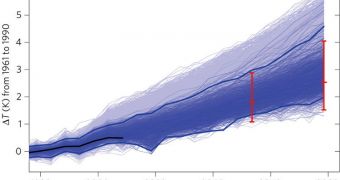A new investigation analyzing how fast global warming is changing Earth's climate suggests that average temperatures on our planet could increase by 1.4 to 3 degrees Celsius, from values recorded just a few decades ago, by 2050.
Previously, it was though that such warming would occur within a century, but the new data contradict that theory, suggesting that the climate is changing at a much faster pace. The new investigation refined the largest sources of uncertainty in existing climate models.
All of these simulations are based on large numbers of factors that contribute to determining Earth's climate. The full extent of the actions some of these factors have on climate is not fully understood, and so they represent sources of uncertainty that erode the precision of these models.
In the new study, experts addressed these troublesome factors, by including the latest data in a series of models. Global warming is primarily influenced by land-sea-air heat transfers, greenhouse gases, solar activity, the light-scattering effect of pollutants, cloud cover extents, and so on.
Researchers addressed three aspects of current climate models that represent a source of uncertainty. They looked at how atmospheric carbon dioxide (CO2) concentrations influence climate, as well as at how much heat oceans absorb from the atmosphere.
The third factor is the amount of global cooling produced by tiny particles in the atmosphere called aerosols, which reflect a large amount of sunlight back into space, Science Now reports. The work was led by University of Oxford climate scientist Daniel Rowlands.
His group carried out thousands of simulations based on the new model. In each of these simulations, researchers included slightly-altered variations of different parameters, which covered a time span stretching from 1920 to 2080.
The models took into account a rise in atmospheric CO2 concentrations from 392 parts per million to 520 ppm within the next four decades. They accounted for solar radiation and volcanic activity variations, both of which can have an impact on Earth's climate.
The conclusion was that average temperatures in 2050 will be up to 3 degrees Celsius higher than those recorded between 1960 and 1990. The minimum warming value will be 1 degree Celsius, in the best-case scenario, the team reported in the March 25 online issue of the journal Nature Geoscience.

 14 DAY TRIAL //
14 DAY TRIAL //